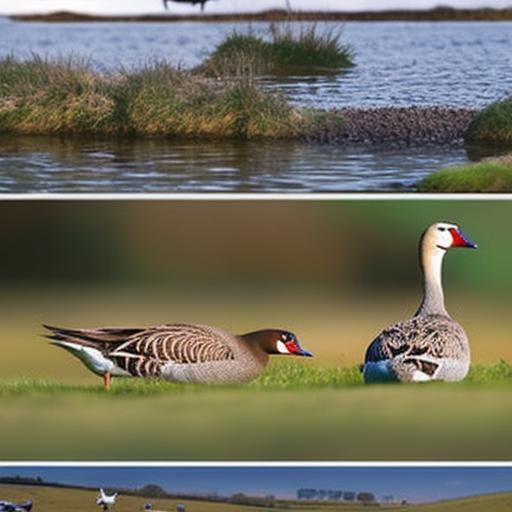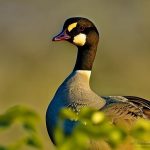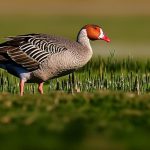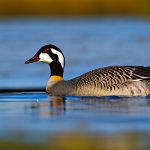Keeping geese has a long history in the United Kingdom, dating back to ancient times. Geese were originally domesticated for their meat, eggs, and feathers. They were also used as guard animals, as their loud honking and aggressive nature can deter intruders. Today, keeping geese is still popular in the UK for both commercial and backyard purposes.
There are several benefits to keeping geese. Firstly, they are excellent grazers and can help maintain your lawn or pasture by eating grass and weeds. They also produce high-quality meat and eggs, which can be a valuable addition to your diet or a source of income if you choose to sell them. Additionally, geese are relatively low-maintenance animals and can be easy to care for with the right knowledge and resources.
Key Takeaways
- Keeping geese in the UK is a rewarding and enjoyable experience for many people.
- Choosing the right breed of geese is important, as different breeds have different characteristics and purposes.
- Housing and fencing requirements for geese are relatively simple, but it’s important to provide adequate space and protection from predators.
- Feeding and watering geese is straightforward, but it’s important to provide a balanced diet and clean water.
- Understanding geese behavior and social structure is key to keeping them happy and healthy, and can help prevent aggression and other issues.
Choosing the Right Breed of Geese for Your Needs
There are several popular breeds of geese in the UK, each with its own unique characteristics and purposes. Some of the most common breeds include Toulouse, Embden, Chinese, and African geese.
When choosing a breed of geese, there are several factors to consider. Firstly, you should consider your purpose for keeping geese. If you are primarily interested in meat production, then larger breeds like Toulouse or Embden may be more suitable. If you are looking for good egg production, then Chinese or African geese may be a better choice.
Other factors to consider include the climate in your area, as some breeds are more cold-hardy than others, and the availability of breeders or hatcheries near you. It is also important to consider the temperament of the breed, as some geese can be more aggressive or noisy than others.
Housing and Fencing Requirements for Geese
Geese require proper housing to protect them from the elements and predators. There are several types of housing options for geese, including sheds, barns, or simple shelters. The housing should provide enough space for the geese to move around comfortably and should be well-ventilated to prevent respiratory issues.
In addition to housing, geese also require proper fencing to keep them safe and contained. Geese are strong and can fly short distances, so it is important to have a fence that is at least 3-4 feet high to prevent them from escaping. The fence should also be secure and predator-proof to protect the geese from predators such as foxes or dogs.
To further protect your geese from predators, you can consider using electric fencing or adding a wire mesh apron around the perimeter of the fence. This will help deter predators from digging under the fence and accessing your geese.
Feeding and Watering Geese: What You Need to Know
Geese have specific dietary needs that must be met for them to thrive. They require a balanced diet that includes a combination of grains, greens, and protein. Commercially available goose feed can be a convenient option, but you can also supplement their diet with fresh greens, vegetables, and grains.
It is important to provide fresh, clean water for your geese at all times. Geese require water for digestion and to keep their feathers clean. A shallow dish or trough that is easily accessible to the geese is ideal. Make sure to clean and refill the water container regularly to prevent contamination.
In addition to their regular diet, geese also enjoy grazing on grass and foraging for insects. Providing access to a pasture or allowing them to graze in a controlled area can help meet their natural grazing instincts.
Understanding Geese Behavior and Social Structure
Geese are highly social animals with a complex social structure. They communicate through honking and body language, and they form strong bonds with their flock mates.
Understanding geese behavior is important for handling and managing them effectively. Geese can be territorial and protective of their flock, so it is important to approach them calmly and confidently. Avoid sudden movements or loud noises that may startle them.
Geese also have a pecking order within their flock, with dominant individuals asserting their authority over others. It is important to establish yourself as the leader and maintain a consistent hierarchy to prevent aggression or bullying within the flock.
Health and Disease Management for Geese
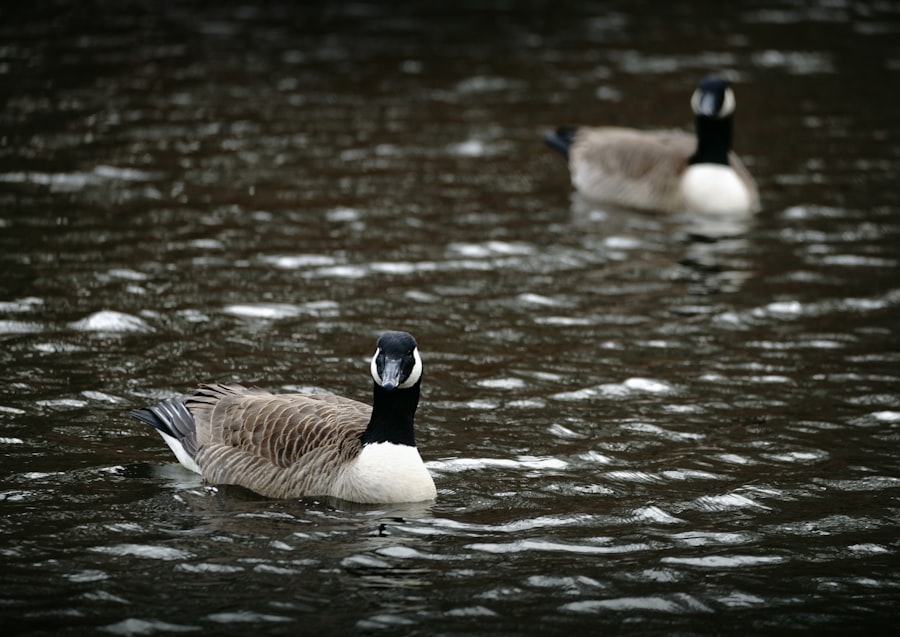
Like any livestock, geese are susceptible to certain health issues and diseases. Common health issues in geese include respiratory infections, parasites, and foot problems.
To prevent health issues, it is important to provide a clean and dry environment for your geese. Regularly clean their housing and remove any wet bedding or droppings. Provide regular veterinary care, including vaccinations and deworming, to keep your geese healthy.
It is also important to practice good biosecurity measures to prevent the spread of diseases. This includes quarantining new birds before introducing them to your flock, limiting contact with wild birds, and practicing good hygiene when handling your geese.
Breeding and Hatching Geese in the UK
Geese have a specific breeding season, which typically occurs in the spring. During this time, the female goose will lay eggs and incubate them until they hatch.
The incubation period for goose eggs is approximately 28-35 days. During this time, it is important to provide a warm and secure nesting area for the female goose. You can use a nesting box or provide a secluded area with straw or hay for her to lay her eggs.
Once the goslings hatch, they will require special care and attention. They should be kept in a warm brooder with access to food and water. It is important to monitor their temperature and provide appropriate heat sources to keep them warm.
Raising Goslings: Tips for Success
Raising goslings can be a rewarding experience, but it requires careful attention and care. Goslings have specific dietary needs and require a balanced diet to grow and develop properly.
When raising goslings, it is important to provide them with a high-quality starter feed that is specifically formulated for their nutritional needs. This feed should be supplemented with fresh greens and vegetables to provide additional nutrients.
Goslings also require access to clean water at all times. Use a shallow dish or trough that is easily accessible to them. Make sure to clean and refill the water container regularly to prevent contamination.
It is also important to provide a warm and secure brooder for the goslings. Use a heat lamp or brooder plate to provide the necessary warmth, and make sure to monitor the temperature regularly to ensure they are comfortable.
Harvesting and Processing Geese for Meat and Eggs
If you are raising geese for meat or eggs, there will come a time when you need to harvest and process them. Harvesting geese for meat involves slaughtering them in a humane manner and processing the meat for consumption.
To harvest geese for meat, it is important to use humane methods that minimize stress and pain. This can include using a sharp knife to quickly sever the jugular vein or using a mechanical device such as a captive bolt gun.
Once the geese are harvested, the meat can be processed by plucking the feathers, eviscerating the bird, and preparing it for cooking or storage. It is important to follow proper food safety guidelines when handling and processing poultry to prevent contamination.
Selling Geese and Their Products in the UK Market
There is a market for geese and their products in the UK, including meat, eggs, feathers, and down. If you are interested in selling geese or their products, there are several factors to consider.
Firstly, it is important to identify your target market and understand their preferences and demands. This can include local consumers, restaurants, or specialty markets. Conduct market research to determine the demand for geese and their products in your area.
When selling geese or their products, it is important to comply with legal requirements and regulations. This can include obtaining the necessary licenses or permits, following food safety guidelines, and labeling products correctly.
In conclusion, keeping geese in the UK can be a rewarding experience. By choosing the right breed, providing proper housing and fencing, understanding their behavior and social structure, managing their health, breeding and hatching, raising goslings, harvesting and processing, and selling their products, you can successfully raise geese and enjoy the benefits they bring. With proper care and attention, geese can be a valuable addition to your farm or backyard.
If you’re interested in keeping geese in the UK, you may also find this article on poultrywizard.com about the mating season for turkeys quite informative. Understanding the breeding patterns and behaviors of turkeys can provide valuable insights into managing and caring for geese. Check out the article here to learn more. Additionally, if you’re considering building a garden chicken coop for your geese, this article on poultrywizard.com provides helpful tips and guidelines on how to create a suitable living space. Discover more about garden chicken coops here. Lastly, if you’re wondering about the ideal size of a coop for your geese, this article on poultrywizard.com offers insights into determining the appropriate dimensions. Find out more about coop sizes here.
FAQs
What are geese?
Geese are waterfowl birds that belong to the family Anatidae. They are known for their long necks, webbed feet, and distinctive honking calls.
Why keep geese in the UK?
Geese can be kept for a variety of reasons in the UK, including as pets, for their eggs, meat, or feathers, or as a form of pest control.
What do geese eat?
Geese are herbivores and primarily eat grass, grains, and other vegetation. They may also eat insects and small aquatic animals.
How do you care for geese?
To care for geese, they need access to clean water for swimming and drinking, a balanced diet, shelter from the elements, and protection from predators. They also require regular health checks and vaccinations.
What are some common health issues for geese?
Common health issues for geese include respiratory infections, parasites, and injuries from predators or accidents. Regular health checks and vaccinations can help prevent these issues.
Are there any laws or regulations regarding keeping geese in the UK?
Yes, there are laws and regulations regarding keeping geese in the UK. These include requirements for proper housing, food and water, and protection from predators. It is important to research and comply with these regulations to ensure the health and safety of the geese and their owners.
Meet Walter, the feathered-friend fanatic of Florida! Nestled in the sunshine state, Walter struts through life with his feathered companions, clucking his way to happiness. With a coop that’s fancier than a five-star hotel, he’s the Don Juan of the chicken world. When he’s not teaching his hens to do the cha-cha, you’ll find him in a heated debate with his prized rooster, Sir Clucks-a-Lot. Walter’s poultry passion is no yolk; he’s the sunny-side-up guy you never knew you needed in your flock of friends!

